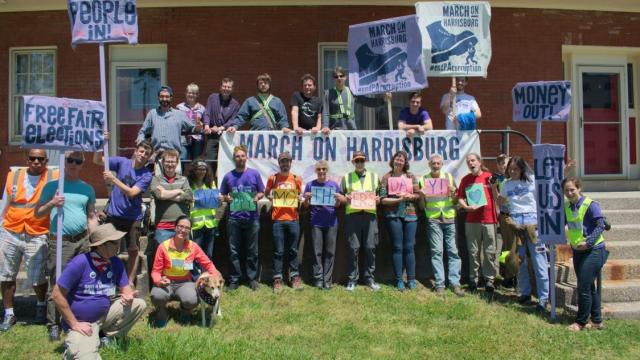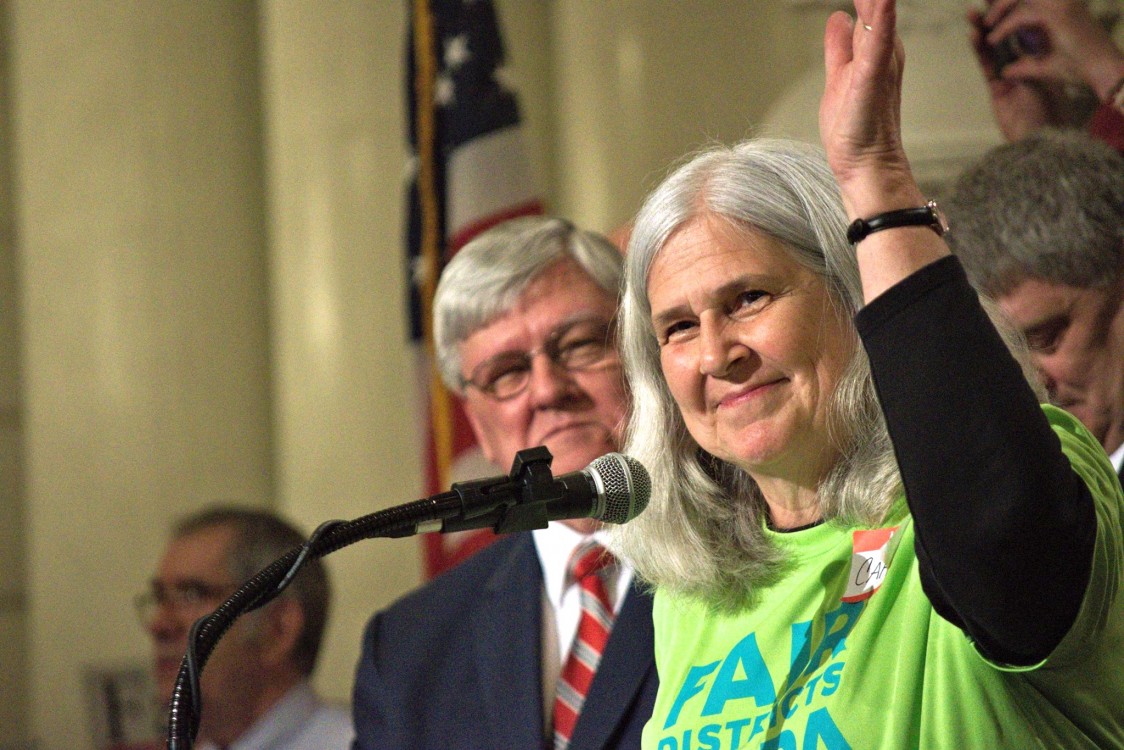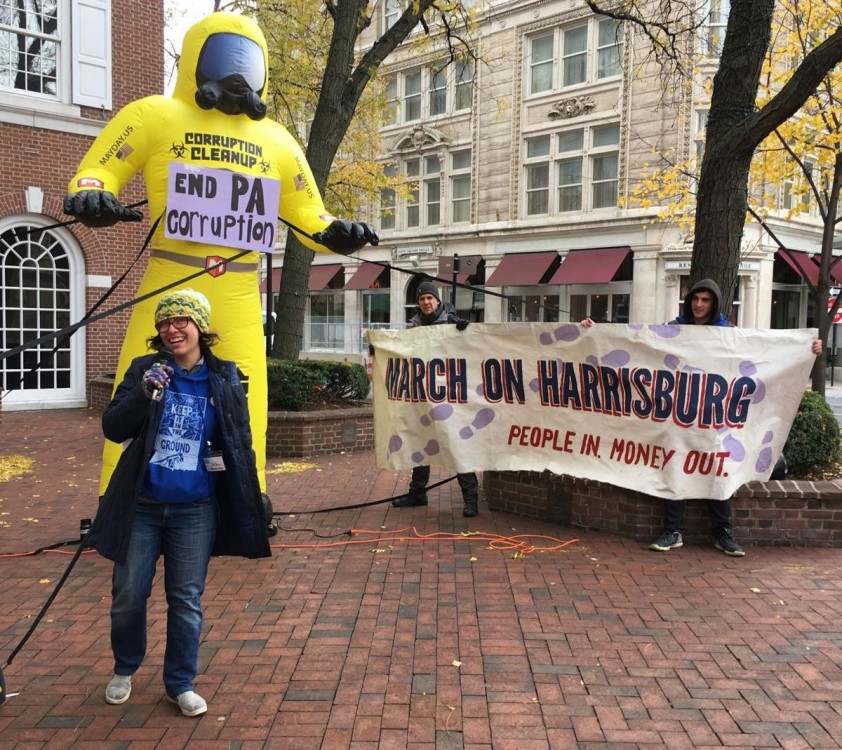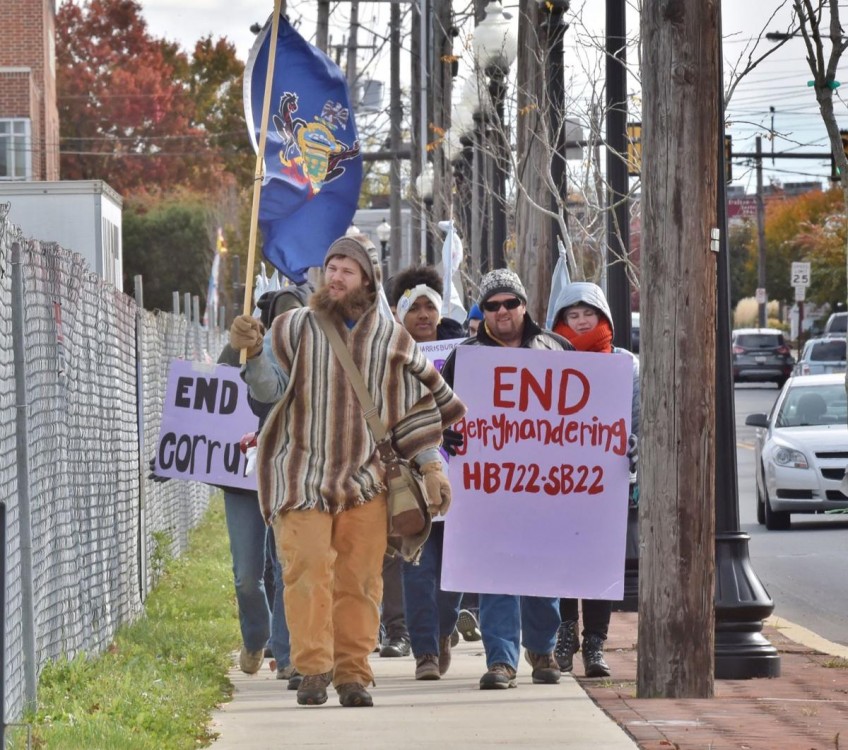
It’s true that America is divided – just not necessarily along the lines you think. Even before there were Republicans and Democrats, there were folks worried about money in politics, folks who directly benefitted from money in politics, and folks who didn't even know there was a crisis going on. So it remains today, as the stagnation of wages, the rise of inequality and partisan political gridlock are all enduring consequences – and symptoms – of this proximate problem: the corrosive influence of money on our political system.
In recent years – particularly since the 2010 Supreme Court decision on Citizens United – grassroots organizing has attempted to tackle the crisis, from Occupy Wall Street to the New Hampshire Rebellion to Democracy Spring. Now, Harrisburg, the capital of Pennsylvania, has become an unlikely frontline in the progressive “Blue Wave” that is rising to challenge Donald Trump and the GOP's hold on power in 2018.
March on Harrisburg Brings National Issues to Statewide Politics
It’s easy to believe there is a deep divide between our daily lives and the political process that happens in our state capitals. If anything, March on Harrisburg seeks to convince people that grassroots mobilization will reveal this gap for what it is – a political tool. We aren’t meant to believe that what we do, or what we march for, or who we elect, on the local level, has any real larger-scale consequences.
The founder of March on Harrisburg, Michael Pollack, took his inspiration from Democracy Spring, less a centralized organization than a nationwide resistance movement. Pollack was among many protestors arrested in Washington, DC, for speaking out publicly against the corrosive relationship between money and politics.
“We are pro-democracy and anti-corruption. Being anti-corruption means standing against anything that divides people,” Pollack told Occupy.com in a recent interview. He described how bribery, in the form of unlimited influence by moneyed interests on the political process, creates two groups of people: those who can afford to participate in politics and those who cannot.
When democracy works properly, each person in the United States should have an equal amount of influence on the political process: like the old adage says, one person one vote. But that is not remotely the way things work now, said Pollack. Even before the Supreme Court's decision on Citizens United that handed corporations unlimited spending power over public elections, rules concerning campaign donations from wealthy individuals and corporations were blurry and only loosely enforceable. Citizens United took what was already a precarious position and turned it into a veritable crisis.
Financially successful entities can now, for instance, funnel virtually unlimited funds toward pro-privatization, anti-regulation and anti-taxation candidates, who then further reduce government’s oversight of dangerous harmful industries and further shift the tax burden from corporations on to Middle America.
Have you noticed your taxes going up without your receiving anything in return? You can thank money in politics for that. You probably can’t afford to reduce your tax burden through lobbying. Guess who can?
Pollack understands as well as anyone that this situation simply describes capitalism working the way it was intended: to favor the rich. Pollack equally recognizes the role that partisan politics play in maintaining money’s influence on politics: “It’s not always clear which is the party of corruption,” he said, but capitalism’s endgame was always going to be the total erosion of democracy.
Making a difference now, at this late stage in the game, comes down to how effective one can communicate the issue. Progressives understand that the staunchest Trump supporter agrees with the staunchest liberal on a panoply of issues. “We sit down with people who have MAGA hats on their desk and talk with them as human beings, often with really great results,” he added.
Gauging the Success of March on Harrisburg?
Pollack, through March on Harrisburg, has spent the last couple of years trying to change the political conversation in Pennsylvania for the better. Much of the group's efforts in 2017 centered on lobbying for several pieces of state legislation with specific anti-corruption measures in mind.
One of those measures was SB 132, and its equivalent in the House, HB 39, a so-called “gift ban” that would limit financial and material gifts to public officials. The other, SB 22 and HB 722, is a bill with bipartisan support that would establish fair voting districts in Pennsylvania.
March for Harrisburg has engaged in several public demonstrations in support of these and other proposed laws. Several of their nonviolent actions have resulted in arrests. But their brand of peaceful outrage seems at times to be working, like the recent case where the Supreme Court intervened forcing Pennsylvania to draw fairer districting maps in time for the 2018 midterm elections.
Public groups will need to continue the pressure, said Pollack, because Republicans in the state legislature are making noise about impeaching the justices responsible for this decision, trying to undo even this little bit of progress in restoring democracy in the Commonwealth.
Joining a Chorus of Voices
Like many in the progressive movement, March on Harrisburg is seizing on the virtual black hole of leadership in Washington, DC, and the opportunity it represents. The organization's goal is nothing less than to remake American democracy, one local and state election at a time.
That’s why March on Harrisburg has joined with the other major pro-democratic movements reshaping the country, formally and informally collaborating with Democracy Spring, Lawrence Lessig’s New Hampshire Rebellion, the Poor People’s Campaign, the multi-state teacher strikes and other public demonstrations. Its overarching mission: to raise awareness, and inspire action, concerning the precarious position in which American democracy currently finds itself.
March on Harrisburg enjoys close ties with another great pro-democracy movement in America – the fight for union representation. A working relationship with the Teamsters brings March for Harrisburg’s message to more than 1.4 million fundraising members from the Teamsters alone, and further cements the understanding that when union membership and representation is strong, so too is people's engagement in the democratic process.
Looking ahead, March on Harrisburg leaders hope to organize some 200 local chapters throughout Pennsylvania, shifting the balance in the 2018 midterms and beyond. What’s at stake, said Pollack, is more years of austerity and more years of wealthy elites consolidating their power over politics, money and manufacturing. There's a growing sense that if people don’t seize a place at the negotiating table now, they might not get another shot. As former President Jimmy Carter said last year, democracy is dead in America and oligarchy has become the rule rather than the exception.
The question March on Harrisburg and so many others are now asking is: So what the hell are we going to do about it?




















